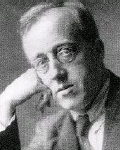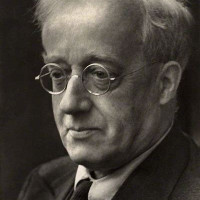

Theodor von(Gustavus) Holst(Theodore von Holst)
Born: 1874Died: 1934
Education: From 1895 Holst studied composition and the trombone at the Royal College of Music
Career: Carl Rosa Opera Company and the Scottish Orchestra, In 1903 he took up a teaching position at James Allen’s Girls’ School in Dulwich
Gustav Holst was one of the most original composers of his generation, drawing influences both from the English madrigal and folksong traditions and from Hindu philosophy. Born in Cheltenham in 1874, Holst is remembered today principally for his popular orchestral work The Planets, though his considerable output encompassed opera, ballet and other stage works, as well as choral, orchestral, chamber music and songs. Much of this music was neglected after his death, but a revival of interest from the 1980s onwards led to a proliferation of recordings and performances. He was also a seminal figure in the development of several younger English composers, notably Michael Tippett, Benjamin Britten and Edmund Rubbra. From 1895 Holst studied composition and the trombone at the Royal College of Music, where his teachers included Charles Villiers Stanford and Hubert Parry. Like many of his contemporaries, Holst was powerfully drawn to the music of the German composer Richard Wagner, and much of his early music betrays Wagner’s influence. Perhaps his most important musical influence in terms of his later development as a composer, however, was Ralph Vaughan Williams, a fellow student at the RCM who would become a close friend. In the 1890s he also developed an interest for Hindu literature and philosophy and took lessons in Sanskrit at University College London, gaining sufficient understanding of the language to allow him to set Sanskrit texts to music. At first Holst pursued a career as an orchestral trombonist, taking up positions with the Carl Rosa Opera Company and the Scottish Orchestra, but continued to compose in his spare time. In 1903 he took up a teaching position at James Allen’s Girls’ School in Dulwich, before being appointed head of music at St Paul’s Girls’ School in Hammersmith in 1905, where he remained until the end of his life. He also later took up teaching positions at Morley College, the RCM, and at University College, Reading, but regularly retreated with his wife to a cottage near Thaxted in the Essex countryside to compose. Along with many of his contemporaries, Holst drew inspiration from the revival in interest in the English folk music tradition, led by such figures as Cecil Sharp and Ralph Vaughan Williams. Holst’s orchestral work A Somerset Rhapsody (1906-7), for example, was based on folk songs that had been transcribed by Cecil Sharp in the county of Somerset. Its first performance at the Queen’s Hall in 1910 was described by the composer as ‘my first real success.’ The premiere of The Planets by the New Queen’s Hall Orchestra in 1918 brought Holst widespread recognition for the first time and stimulated interest in some of his earlier works, which were subsequently performed and published for the first time. Perhaps the most important of these was the one-act chamber opera Sāvitri, to a libretto written by the composer on a Hindu subject, which had been composed in 1908 at the culmination of his early interest in the religion but was given its first professional performance only in 1921. Despite composing some 11 works for the stage, however, none of them entered the repertoire in the longer term. His opera The Perfect Fool, first performed at Covent Garden in 1923, was received enthusiastically but regarded as a failure by the composer himself. Demand for his music nevertheless continued in the 1920s. A major festival devoted to Holst’s music was mounted in Cheltenham in 1927, while his newfound fame led to performances by several major orchestras in the USA and a first visit there by the composer himself in 1927. His appointment in 1932 as a visiting lecturer at Harvard University, where he taught amongst others the great American composer Elliott Carter, was cut short when he fell ill and returned to the UK. Severely weakened, he nevertheless continued to compose, producing such characteristic works as the Brook Green Suite and the Lyric Movement for viola and orchestra, before his untimely death from heart failure on 25 May 1934. His daughter Imogen arranged for a substantial collection of his music manuscripts – including some previously unpublished works – to be deposited at the British Museum Library (now the British Library) in the 1950s.

